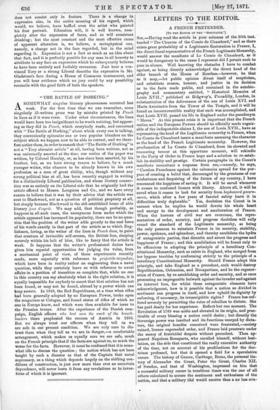"THE BATTLE OF DORKING."
SOMEWHA.T singular literary phenomenon occurred last
week. For the first time that we can remember, some singularly ill-written prose was by mistake printed by Punch in lines as if it were verse. Under other circumstances, the lines would have been too insignificant to be worth noticing, but appear- ing as they did in Punch, which everybody reads, and concerned with "The Battle of Dorking," about which every one is talking, they conveniently epitomize one or two popular blunders on the subject which we happen now to be able to correct, and we there- fore notice them, in order to remark that "The Battle of Dorking" is not a "Tory alarmist article" at all, having been written, not as was universally asserted at the time our notice of the paper was written, by Colonel Hamley, or, as has since been asserted, by his brother, but, as we have strong reason to believe, by a much younger writer, who chances to be already known in his own profession as a man of great ability, who, though without any strong political bias at all, has been recently engaged in writing for a distinctively Liberal publication, and whose literary connec- tion was so entirely on the Liberal side that he originally had the article offered to Messrs. Longman and Co., and we have every reason to believe that it was by their advice that the article was sent to Blackwood, not as a question of political propriety at all, but simply because Blackwood is the old-established home of able literary jeux d'esprit. We may add, that though probably, as happens in all such cases, the anonymous form under which the article appeared has increased its popularity, there can be no ques- tion that the position of the writer adds greatly to the real force of his words exactly in that part of the article as to which Eng- lishmen, loving, as the writer of the lines in Punch does, to paint that creature of invincible self-esteem, the British lion, sleeping securely within his belt of blue, like to fancy that the article is weak. It happens that the writer's professional duties have given him especial opportunities for judging the value, from a mechanical point of view, of those experiments recently made, more especially with reference to projectile-torpedoes, which have been in reality rather an engineering than a naval question, while they certainly leave us with reference to naval affairs in a position of transition so complete that, while no one in this country can say absolutely what is the right solution, it is equally impossible for anybody to assert that that solution has not been found, or may not be found, abroad by a power which can keep secrets. In 1848, the Red Republicans, at a time when rifles had been generally adopted by no European Power, broke open the magazines at Cologne, and found stores of rifles of which no one in Europe knew, and which were then available for issue to the Prussian troops. After the experience of the Danish cam- paign, English officers who had seen the work of the breech- loaders there prophesied the success of Austria in 1866. But we always trust our officers when they toll us we are safe in our present condition. We are only sure to dis- trust them when they tell us we are in danger,—a comfortable arrangement, which makes us equally sure we are safe, much on the French principle that if the facts are against us, so much the worse for the facts. However, it must be confessed that itis some- what idle to discuss the question ; the nation which has not been taught by such a disaster as that of the Captain that naval supremacy, as a thing which depends largely on the shifting con- ditions of construction, is just now more than ever an uncertain dependence, will never learn it from any revelations as to inven- tions of which it is ignorant.


































 Previous page
Previous page